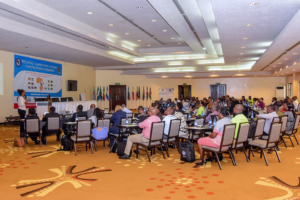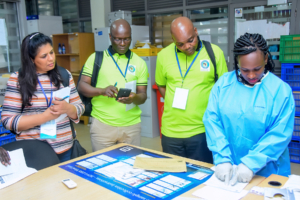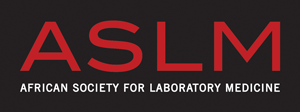
Delegates attend the ECSA-HC workshop
To complement the efforts of other partners like ASLM in building resilient laboratory systems in Africa, the East, Central and Southern Africa Health Community (ECSA-HC) and Ministry of Health Uganda convened a regional laboratory system strengthening workshop for HIV viral load (VL) and early infant diagnosis services in Kampala from 1 to 3 July 2019.
The objective of the workshop was to provide an opportunity for South-to-South knowledge exchange and identification of best practices across five thematic areas:
- Laboratory process and network optimisation
- Laboratory information management systems
- Sample transport and laboratory-clinic interfaces
- Sample chain of custody, remnant sample storage and waste management
- Logistics, equipment management, and accessory services
The meeting targeted multi-disciplinary country teams consisting of a laboratory policy maker at the national level, a laboratory manager in charge of the VL laboratory network, an Information Communication Technology manager in charge of the VL laboratory network, a sample transport network manager, and an expert in charge of the laboratory-clinic interface or an expert in charge of logistics and supply chain. Over 100 participants from 13 countries (Uganda, Kenya, Tanzania, Nigeria, Malawi, Zimbabwe, Zambia, Democratic Republic of Congo, Ethiopia, Lesotho, South Africa, South Sudan and Sierra Leone) and global stakeholders including The Global Fund, the President’s Emergency Plan for AIDS Relief (PEPFAR), the World Health Organization (WHO) and ASLM, among others attended the meeting.
Her Excellency Deborah R. Malac, the United States Ambassador to Uganda emphasized the need to build resilient laboratory systems in Africa, while Linden Morrison from The Global Fund emphasized the commitment of The Global Fund to support the strengthening of laboratory systems in Africa. The guest of honour, Dr Ruth Jane Aceng, Minister of Health, Uganda, encouraged country teams to use the opportunity to learn from one another, so as to improve laboratory systems in their respective countries.
Several plenary sessions structured around the above thematic areas were held during the three-day meeting. During a few of these sessions Ndlovu Nqobile, Chief Executive Officer of ASLM, Charles Kiyaga, LabCoP Technical Lead and Anafi Mataka, ASLM Senior Scientist, highlighted ASLM’s contribution to laboratory system strengthening, particularly the Laboratory Systems Strengthening Community of Practice, or ‘LabCoP’. Collectively, the presenters summarised LabCoP’s achievements to date, which include the creation of an interactive community of over 200 individuals from 11 country teams and additional key organisations in the field of laboratory strengthening. Additionally, LabCoP is working towards the common goal of scaling up VL testing through system improvement along the entire VL testing cascade. The tools and guidelines developed by LabCoP were presented as useful resources and relevant starting points for furthering knowledge across some of the themes selected by ECSA-HC.

Delegates tour Uganda’s Central Public Health Laboratory in Kampala
Delegates were invited to tour Uganda’s Central Public Health Laboratories and received demonstrations of laboratory strengthening best practices. Delegates also participated in breakout sessions, during which country groups discussed each thematic area with direct assistance from subject matter experts. WhatsApp groups were also established for each thematic area, to ensure that the outcomes of this South-to-South collaboration continues long after the meeting concluded.
Insightful information and guidance were provided on leveraging HIV resources to build over-arching laboratory systems that support the wider needs of healthcare delivery, to address laboratory system gaps as a regional effort, and to learn from the regional grants’ successes and challenges. The regional programme ECSA-HC is running with the Ugandan Tuberculosis Supra National Laboratory, supports 18 countries, and is a concrete example of how these ideas can be applied. The presentations were complemented by an engaging round table panel discussion, chaired by Prof Yoswa M. Dambisya, Director General of ECSA-HC, entitled ‘How to advocate, mobilize resources, and build strong leadership for laboratory services in countries’.
The meeting concluded with a colorful closing ceremony, during which participants were presented with certificates of attendance. The ceremony was presided over by Dr Diana Atwine Kanzira, Permanent Secretary of the Ministry of Health Uganda, and was graced by the presence of seven Ambassadors and representatives from the embassies and high commissions of the countries that sent participants to this workshop. They all emphasized the importance of regional corporation in addressing health challenges in their closing presentations.
Author: Dr Charles Kiyaga
Editor: Mrs Bethanie Rammer
About ASLM
Established in 2011, the African Society for Laboratory Medicine (ASLM) is a pan-African professional body focused on improving healthcare by strengthening all aspects of laboratories including workforce strengthening, quality improvement and accreditation, harmonization of regulations, strengthening of networks, and strengthening advocacy and communications. Laboratory testing is pivotal for disease diagnosis, epidemiological surveillance, outbreak investigation, and initiation and monitoring of treatment, as well as research and development. ASLM addresses these challenges by working collaboratively with governments; national, regional and international organizations; implementing partners, the private sector and other agencies to achieve its Strategic Vision goals. ASLM is endorsed by the African Union with support from the World Health Organization, Africa CDC, the United States (US) Centers for Disease Control and Prevention, the US President’s Emergency Plan for AIDS Relief, the World Bank, the Clinton Foundation, UNAIDS, and others.
Become a member of ASLM here.

